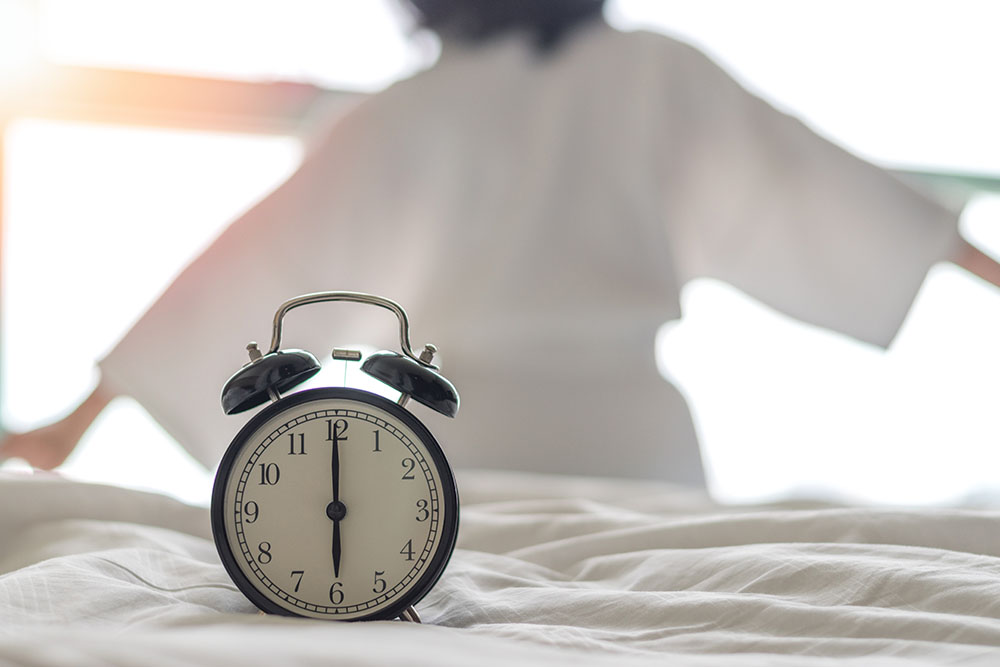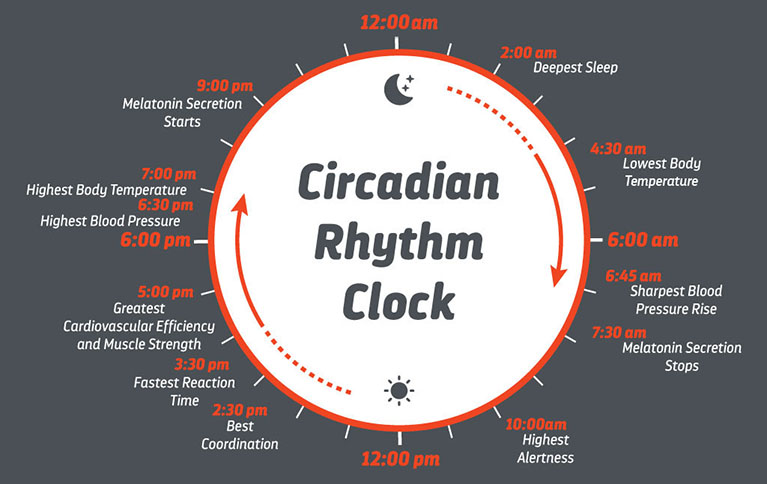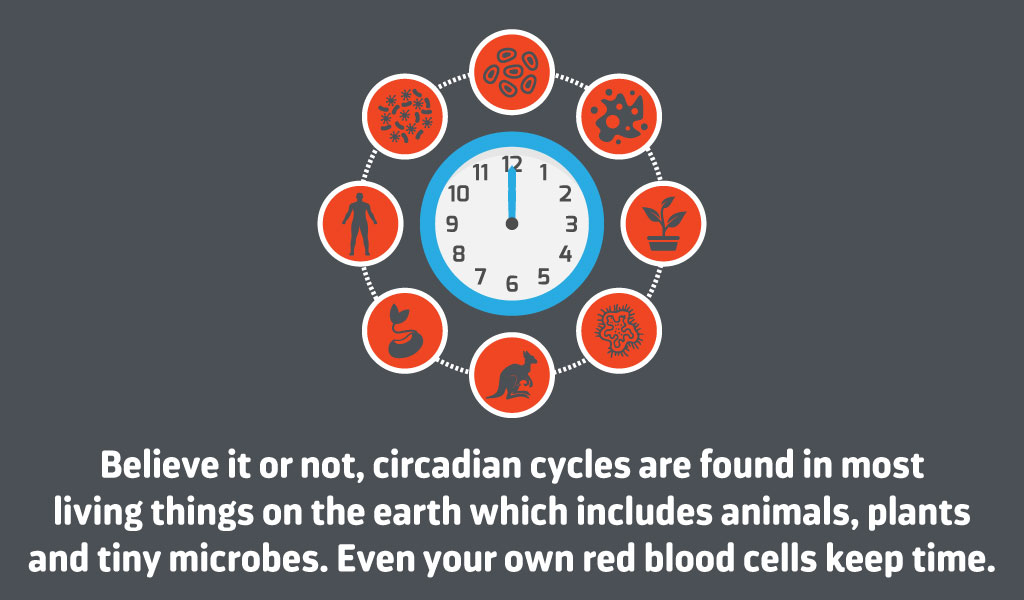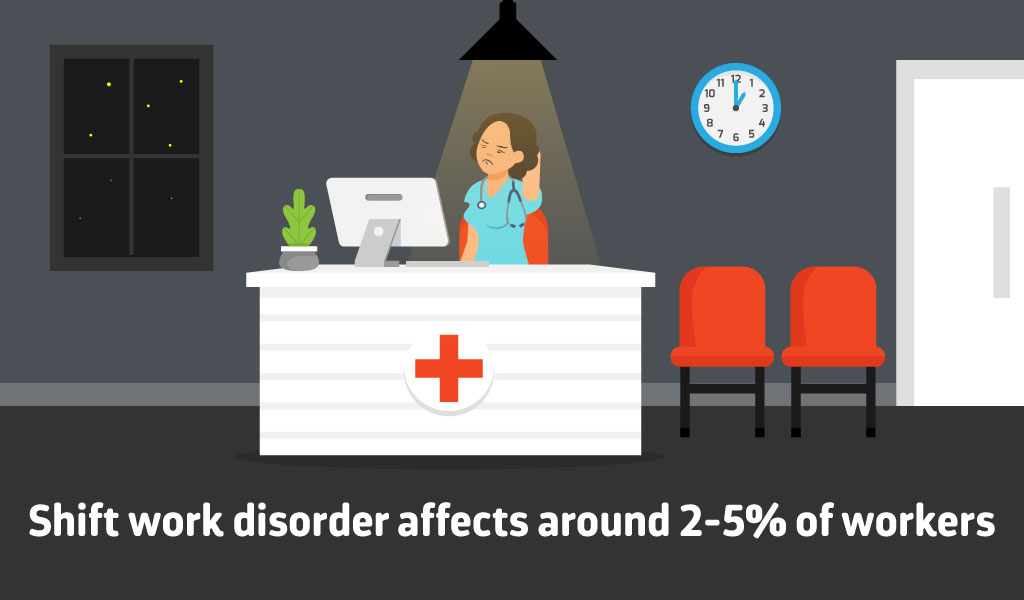What is Circadian Rhythm (And Why Your Circadian Clock is Important)

In simpler terms, your circadian rhythm is why most people feel sleepy at night and awake in the morning. Circadian means “around the day,” so you can think of it as the little 24-hour clock that sends signals to the rest of your body that it’s time to get up, eat, or feel sleepy. But your circadian rhythm is not immutable—it can be complicated by travel, technology, shift work, age, and other variables.

Below, we’ve compiled answers to some frequently asked questions about your circadian rhythm, what disrupts it, and how to help support your natural circadian clock.
What is your circadian rhythm exactly?
Circadian rhythms inform the body when to sleep, wake up, and eat. These biological and psychological processes fluctuate in predictable patterns each day. Your inner clock is influenced by external cues like sunlight and temperature, which can help you feel refreshed and energetic or tired during different parts of the day.
Believe it or not, circadian cycles are found in most living things on the earth, including animals, plants, and tiny microbes. Even your own red blood cells keep time.
Curious to see what a typical person’s circadian clock might look like? Well, for someone who wakes up at 6:00 am, their lowest energy levels would hit between the hours of 2:00 am and 4:00 am. Shortly after waking up, melatonin release stops. The mid-morning period is when you’ll enjoy the highest alertness levels.
There may be a small dip in energy after lunch at noon, but by mid-afternoon, you can expect boosts in your reaction time and coordination. Melatonin, the hormone that revs up your sleepy feelings, is typically released around 8:00 or 9:00 pm. Ideally, bedtime hits around 10:00 pm so you can take advantage of when you start to feel ready for bed.
Of course, most people don’t stick to their own circadian rhythm to a T. Your internal clock may vary based on your natural tendencies and lifestyle.

What’s your master clock?
Obviously, a small digital clock inserted into your brain isn’t ruling over your body, telling you when to go to sleep. Instead, your “master clock” is a group of neurons sitting in your brain’s hypothalamus. Your hypothalamus is at the base of your brain and has quite a few important jobs, including regulating your emotional responses, managing your sexual behavior, controlling appetite, governing your physiological cycles, regulating your body temperature, and releasing hormones.
This helpful group of neurons in your brain translates environmental cues into instructions for how the body should appropriately respond. In most cases, your body’s internal clock means that you feel alert when it’s bright outside and tired when it starts getting dark. But your circadian rhythm also has a major impact on how you feel during the day, not just when you wake up and start getting sleepy.
For example, many people feel a significant drop in their energy or the dreaded “afternoon slump” around the hours of 1:00 pm and 3:00 pm.
What happens if my circadian rhythm is disrupted?
A perfect sleep schedule is untenable for many people. After all, there are probably some workdays where you might be forced to burn the midnight oil to meet a deadline. Then, perhaps, you “make up for it” by sleeping in way past your normal wake-up time on the weekend. These types of schedule disruptors can throw your internal clock off.
Another common way circadian rhythms get thrown out of their natural cycle is when jet lag occurs. When you’re jet-lagged, your internal clock and external cues get confused. Even a few hours of difference can mean fatigue, grogginess, or grumpiness.
Disrupted circadian rhythm may lead to other deleterious health effects, including sleep disorders, cardiovascular issues, diabetes, and mental health problems.

How does shift work affect circadian rhythms?
Shift work is defined as work schedules that go beyond a traditional 9-to-5 structure. Schedules include early work starts, compressed work weeks with 12-hour shifts, and overnight work. Between 15% and 30% of adult workers do some type of shift work. Shift work disorder affects around 2-5% of workers, according to research.
This type of disorder occurs after a period where a worker’s sleep schedule and natural circadian rhythm are disrupted by his or her work schedule, causing serious sleepiness or sleep disruption for at least a month. According to a National Sleep Foundation poll, only 63% of shift workers reported their schedules allowed for proper sleep. In comparison, 89% of non-shift workers said their work schedule did allow them to get enough sleep.
Some people who are more tolerant to shift work and tolerance can change based on how many days of work they have in a row, rest period times and lengths, and the predictability of work schedules.
However, shift work disorder isn’t the only circadian rhythm disorder out there. Other circadian rhythm disorders include:
- Advanced sleep-wake phase disorder, which makes it difficult to stay awake in the early evening and wake up too early in the morning
- Delayed sleep-wake phase disorder, which makes it difficult to fall asleep at night and wake up on time in the morning
- Irregular sleep-wake rhythm disorder, which is when a person has several short periods of sleep and wakefulness, characterized by the inability to sleep at night and the need for multiple naps throughout the day
If you’re worried you may be suffering from a circadian rhythm disorder, it’s best to consult with your doctor. Some signs and symptoms to look out or include fatigue, exhaustion, consistent difficulty falling or staying asleep, excessive daytime sleepiness, decreased alertness, headaches, and difficulty controlling your mood.

How can I maintain a steady circadian rhythm?
Everyone is different, which is why it’s important to remember that your body’s internal clock may naturally be set earlier or later in the day. But it’s important to keep the cues that influence your circadian rhythm steady to maintain a concrete routine. Here are a few tips on helping your internal clock:

1- Consistent bedtime: Aim to go to bed at the same time every day. Obviously, there are going to be moments and periods in your life where that simply isn’t possible. But to keep a healthy sleep-wake cycle, a healthy nighttime routine and consistent bedtime is a critical part of this equation.
2- Consistent wake-up time: On the flip side, it’s also important to wake up at the same time every day and expose yourself to sunlight.

3- Go outside during the day: It’s incredibly important to go outside during the day. Consider eating lunch outside, walking to a cafe, or sitting near a window at work if you can. Just 15-20 minutes of exposure to the sun can help you feel more alert and awake. Plus, you’ll get your daily dose of Vitamin D as well!
4- Exercise at the right time: Try exercising in the morning to jumpstart those endorphins and give yourself a dose of alertness.
5- Stop scrolling: As tempting as it is to scroll endlessly on Instagram or other online platforms, it’s essential you establish a cut-off point for using your electronics and utilize good sleep hygiene. Turn off the television and keep your phone tucked away one to two hours before bedtime. Blue light exposure can not only keep you up longer, but it can also prevent you from falling into the deepest, most restorative stages of sleep.

6- Change your bedtime slowly: If you need to adjust your sleep schedule, do so gradually to help your body naturally transition to a new bedtime. Try to move your bedtime by 15 minutes each night until you reach your new desired bedtime.

7- Avoid alcohol and caffeine: Don’t drink alcohol or caffeine late in the day, it can have a seriously negative effect on the length and quality of your sleep.
It’s also important to note that your circadian rhythm might change as you get older. If you’re an older adult, your internal clock may lose its consistency as you age. In many cases, seniors may become tired earlier in the evening and wake up earlier in the morning. The net effect for many is fewer overall hours of sleep each night. To combat this lower sleep amount, you can simply work on sticking to a sleep schedule that stays the same each day.
Takeaways: Maintain a healthy circadian rhythm
Scientists are still unraveling the significance and complexity of your body’s circadian rhythm. But, for most people, consistency is the key to supporting a healthy circadian clock. A regular sleep schedule with a set bedtime and set rising time. In addition, it’s a good idea to create a healthy sleeping environment that includes sleep-promoting additions like blackout curtains, a comfortable mattress, and a place to hide your blue-light emitting devices. With these tips, you can enjoy a more alert, vivacious life.





